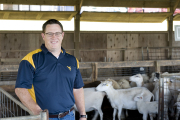West Virginia University scientists are stepping up their attack on farm-based parasites thanks to an emerging laboratory in the Davis College of Agriculture, Natural Resources and Design.
 Scott Bowdridge, an assistant professor of animal and nutritional sciences in the Davis College, is pursuing research designed to help organic sheep producers protect their flocks from potentially deadly gastrointestinal bugs.
Scott Bowdridge, an assistant professor of animal and nutritional sciences in the Davis College, is pursuing research designed to help organic sheep producers protect their flocks from potentially deadly gastrointestinal bugs.
In his relatively short time at WVU, he’s helped to build an energetic research program in parasite immunology. Bowdridge and colleagues are participating in grants worth approximately $2 million, funded by the United States Department of Agriculture and Vi-COR, a livestock feed producer.
The lab’s research examines nutritional, genetic and cellular aspects of parasite immunology.
“The focus of our research is really to aid producers in managing parasitism in their sheep flocks, and we have approached that problem from the aspect of how can sheep be made more resistant to parasitism as opposed to managing parasitism using therapeutics?” Bowdridge said.
Bowdridge partners with colleagues from the Davis College’s Division of Plant and Soil Sciences and Virginia Tech and with local sheep producers.
“With Scott’s background and research interests, we have recruited a person with a very strong animal agriculture background that is performing cutting-edge science that also happens to be in an area where there is a tremendous need,” said Matt Wilson, interim director of the Davis College’s Division of Animal and Nutritional Sciences.
Four of Bowdridge’s five graduate students took part in the American Association of Veterinary Parasitologists’ annual meeting in Chicago in July, presenting their research in competition with master’s and doctoral students from across North America.
Jessica Jacobs, completing a master’s in animal physiology in preparation for a Ph.D. in the same discipline, ranked fifth in the competition, receiving an honorable mention and paid meeting registration for the 2014 conference.
“I think the most interesting thing about attending AAVP’s national meeting is seeing how your research fits in with other work being done across the country and even around the globe,” Jacobs said. “It’s amazing to see how someone else’s work plays into your own and vice versa. More of the big picture is solved and you really start to feel that the work you do is going to eventually help someone.”
Karen Sommers, a master’s candidate in animal physiology, described the meeting as “an overall great experience.”
“This was the first time I have attended a meeting like this, so being able to present my research to other graduate students and faculty from other schools as well as industry representatives was a little intimidating, but ultimately very rewarding,” Sommers said. “I was able to get some really great feedback that will most certainly help me in any future speaking engagements and the meeting was a great opportunity to network and get to know other people in your field of study.”
Jacobs and Sommers, along with master’s candidates Rush Holt and Rebecca Price, all received Young Investigator Travel Grants from the association to attend the meeting.
“My philosophy towards graduate education in animal science is that students need to have a strong foundation in basic science and in our case that foundation lies in immunology and parasitology,” Bowdridge said.
Bowdridge also welcomes undergraduate students into his lab, with two currently conducting independent research under his supervision. Former student workers have gone on to pursue veterinary education at Auburn, Virginia Tech, and Mississippi State, and medical school at WVU.
“Scott has been very successful in establishing an active, successful research program in no small part due to his dedication to graduate student training,” Wilson added. “I look forward to his future success and to the impact it will have on both the basic science of parasite immunology and practical animal agriculture.”